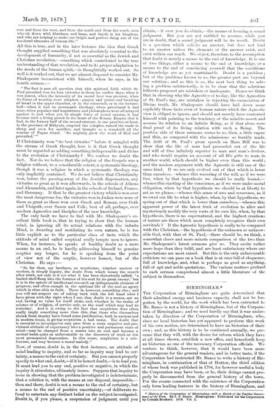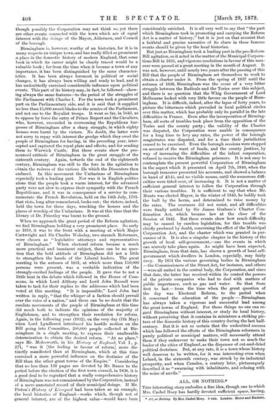BIRMINGHAM.*
TilE Corporation of Birmingham are quite determined that their admitted energy and business capacity shall not be for- gotten by the world, for the work which has been entrusted to Mr. Bunce is not a history of Birmingham, but of the Corpora- tion of Birmingham ; and we need hardly say that it was under- taken by direction of the Corporation of Birmingham, who, since no local historian has yet appeared to perform this work of his own motion, are determined to have an historian of their own ; and, as this history is to be continued annually, we pre- sume that they will, with the desire for reform which they have at all times shown, establish a new office, and henceforth keep an historian as one of the necessary Corporation officials. We- venture to think, however, that it would have been more advantageous for the general readers, and in better taste, if the Corporation had instructed Mr. Bunce to write a history of Bir- mingham, in continuation of that of Hutton, the third edition of whose book was published in 1794, for however useful a body the Corporation may have been, or be, their doings cannot pro- perly be disconnected from the general history of the town. For the events connected with the existence of the Corporation only form leading features in the history of Birmingham, and * History of the Corporation of Birmingham, with a Sketch of the Sterner Govern- ment of the Tow. By J. P. Bunce. anniogham : Published for the Corporation by Cornish Brothers. 1878. Vol. L
though possibly the Corporation may not think so, yet there are other events connected with the town which are of equal interest with the doings of the Mayor, Aldermen, and Council -of the borough.
Birmingham is, however, worthy of an historian, for it is in many respects an unique town, and has really filled so prominent a place in the domestic history, of modern England, that some book in which its career might be clearly traced would be a valuable book ; for from the time when it became a town of any importance, it has been distinguished by the same character- istics. It has been always foremost in political or social changes, it has always been willing and ready to lead, and it has undoubtedly exercised considerable influence upon political events. This part of its history may, in fact, be followed—show- ing always the same features—to the period of the struggles of the Parliament with Charles I. For the town took a prominent part on the Parliamentary side, and it is said that it supplied no less than 15,000 sword-blades to the armies of the Parliament, and not one to the Royalist troops. It went so far, in 1643, as to oppose by force the entry of Prince Rupert and the Cavaliers, who, however, succeeded in overcoming the Republican bur- gesses of Birmingham after a sharp struggle, in which eighty houses were burnt by the victors. No doubt, the latter were not sorry to repay with interest the grudge which they owed the people of Birmingham for having, in the preceding year, inter- cepted and captured the royal plate and effects, and for sending them to Warwick Castle. But these events show the pro- nounced attitude of Birmingham in the great struggle of the sixteenth century. Again, to*ards the end of the eighteenth century, Birmingham was still to the fore in the agitation to obtain the redress of the various ills which the Dissenters then endured. In this movement the Unitarians of Birmingham especially took a leading part. Nor was it in English politics alone that the people took a warm interest, for the advanced party were not slow to express their sympathy with the French Republicans, and it was in consequence of a service to com- memorate the French Revolution, held on the 14th July, 1791, that riots, long after remembered, broke out; the rioters, indeed, held the town for three days, wrecking the houses and the places of worship of the Unitarians. It was at this time that the library of Dr. Priestley was burnt to the ground.
When we approach the great period of the Reform agitation, -we find Birmingham holding a very prominent place. So early as 1819, it was to the front with a meeting at which Major Cartwright and Sir Charles Wolseley, two staunch Reformers, were chosen as "legislative attorneys and representatives of Birmingham." When electoral reform became a much more practical and imminent subject, there can be no ques- tion that the bold attitude of Birmingham did not a little to strengthen the hands of the Liberal leaders. The great meeting in the autumn of 1831, at which more than 150,000 persons were present, was a veritable indication of the strongly-excited feelings of the people. It gave rise to not a little heat in the debate which followed in the House of Com- mons, in which Lord Althorp and Lord John Russell were taken to task for their replies to the addresses which had been voted at this meeting. "it is impossible," Lord John had written in reply, "that the whisper of a faction should prevail over the voice of a nation," and there can be no doubt that the resolute movements of the people of Birmingham at this time did much both to indicate the opinions of the majority of Englishmen, and to strengthen their resolution for reform. Again, in the following year (1832), on the very day (7th May) when Lord Lyndhurst introduced his hostile motion on the Bill going into Committee, 200,000 people collected at Bir- mingham in a single meeting, to express their unalterable determination to obtain the desired reform. "At no place," says Mr. Molesworth, in his History of England, Vol. I., p. 271, "was it [the feeling in favour of reform] more dis- tinctly manifested than at Birmingham, which at this time exercised a more powerful influence on the destinies of the Bill than the other great towns of the Empire." Considering that no less than 138 pages are devoted by Mr. Bunce to the period before the election of the first town council, in 1838, it is a good deal to be regretted that a really comprehensive history of Birmingham was not commissioned by the Corporation, instead of a mere annotated record of their municipal doings. If Mr. Picton's History of Liverpool had been taken as an example, the local histories of England—works which, though not of general interest, are of the highest value—would irave been considerably enriched. It is all very well to say that "the part which Birmingham took in promoting and carrying the Reform Act is a matter of history," but it is just on that account that a faithful and precise narrative of its share in these famous events should be given by the local historian.
But just as Birmingham took a leading part in the pro-Reform Bill agitation, so it acted in the matter of the Municipal Corpora- tions Bill in 1835, and vigorous resolutions in favour of this mea- sure were passed at a great meeting in the month of August. It was no however, until nearly two years after the passing of this Bill that the people of Birmingham set themselves to work to obtain a charter under it. From the spring of 1837 until the autumn of 1838, Birmingham was the scene of a very bitter struggle between the Radicals and the Tories over this subject, and there is no question that the Whig Government of Lord Melbourne looked with very little favour on the people of Birm- ingham. It is difficult, indeed, after the lapse of forty years, to picture the bitterness which prevailed in local political circles over this matter, which has probably only its parallel in the late difficulties in France. Even after the incorporation of Birming- ham, all sorts of troubles took place from the opposition of the Tories and the county party ; the validity of the Charter was disputed, the Corporation were unable in consequence for a long time to levy any rates, the power of the borough magistrates was disputed, and for a time their jurisdiction ceased to be exercised. Even the borough sessions were stopped on account of the want of funds, and the county justices, by way of increasing the difficulties of the infant corporation, refused to receive the Birmingham prisoners. It is not easy to contemplate the present powerful Corporation of Birmingham in the aspect which it presented on April 7th, 1840, when the borough treasurer presented his accounts, and showed a balance in hand of £145, and no visible means, until the numerous diffi- culties were tided over, of increasing it. It is not a matter of sufficient general interest to follow the Corporation through their various troubles. It is sufficient to say that when Mr. Muntz was elected Mayor, in the winter of 1840, he boldly took the bull by the horns, and determined to raise money by the rates. The overseers did not resist, and all difficulties were finally settled by Sir James Graham's Charter Con- firmation Act, which became law at the close of the Session of 1842. But these events show how much difficulty may be caused by careless legislation, for this trouble was chiefly produced by doubt, concerning the effect of the Municipal Corporation Act, and the charter which was granted in pur- suance of it. It is also a singular chapter in the history of the growth of local self-government,—one the events in which can scarcely take place again. As might have been expected, Birmingham, from that date, has shown a growth of local self- government which dwellers in London, especially, may fairly envy. By 1851 the various governing bodies in Birmingham — the Commissioners of the Street Act, for instance, and others — were all united in the central body, the Corporation, and since that date, the latter has received within its control the powers of the private companies who had to deal with matters of public importance, such as gas and water. So that from first to last — from the time when the great question of the day was Electoral Reform, to the period when it concerned the education of the people — Birmingham has always taken a vigorous and successful lead among the great towns of England. For these things no one can re- gard Birmingham without interest, or study its local history, without perceiving that it contains in miniature a striking pic- ture of the domestic history of this country during the last half- century. Bat it is not so certain that the undoubted success which has followed the efforts of the Birmingham reformers in purely political or municipal matters, will necessarily attend them if they endeavour to make their town not so much the leader of the cities of England, as the dispenser of cut-and-dried political doctrines. But, at any rate, it is a town whose history well deserves to be written, for it was interesting even when Leland, in the sixteenth century, was struck by its industrial prosperity, and when Camden, a century later, picturesquely described it as "swarming with inhabitants, and echoing with the noise of anvils."



































 Previous page
Previous page